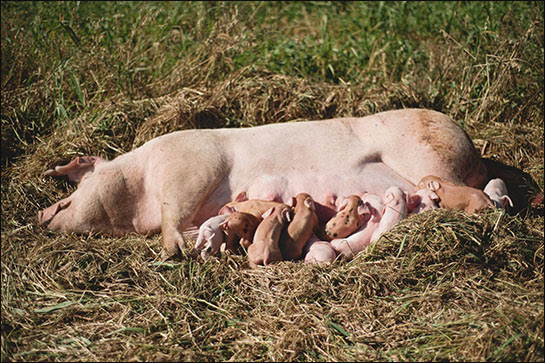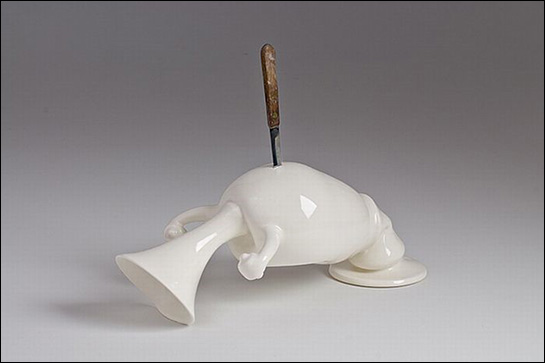How to turn a failure into success, oink oink

During Hurricane Ian millions of gallons of pig feces whooshed across North Carolina. Pig poop gets my attention. I raised my kids on a hog farm and the water was too contaminated to drink due to decades of farming with gestation crates: a birthing invention of factory farms that is a stacked storage system to get the most pigs per acre.
In past years Hurricane Florence and Hurricane Matthew sent feces flying so we know which problems ensue: human sickness, contaminated drinking water, rivers, plants and fish. There’s a race issue as well. The farm owners are white and their pig shit lands on property Black people own.
We don’t see many politicians taking up this cause. The pork lobby owns North Carolina. The only other state with significant hog operations is Iowa, and you can’t win a presidential primary if you trash talk pigs.
But California sidestepped the fact that pork producers don’t live in their state and 68% of voters said California should not permit the sale of pork from gestation crate farms. Many attempts to control the pork producers have failed, so whiners dismissed this one as The Bacon Apocalypse, but attorneys shepherded the law through two appeals, and this week the Supreme Court will hear the case.
The state of California will argue that gestation crates are the worst example of animal confinement. The crates don’t allow any movement for pregnant pigs; they can stand or sit but cannot turn around for most of their life. I hope California also adds something about how pigs have an intense social-emotional life and a higher IQ than dogs.
But like all legal matters, conversation will probably stick to money. The pork industry will invoke interstate commerce laws to say replacing gestation crates with moderately larger pens is too big a burden on businesses outside of California. The Court will use the Pike Test to determine if the consumer’s moral cost of eating ill-begotten pork outweighs the producer’s financial cost of reconfiguring crates to be larger.
The cost argument only works because the meatpacking industry controls farmers, and only the few financially independent hog farmers could study the cost of switching from gestation crates. But also, universities capable of producing this research are funded by gestation crate manufacturers.
My son discovered this problem first-hand. Our farm switched from gestation crates to free-range farrowing while he was growing up. The farmer had a degree in hog genetics and we collected data for nine years using a (mostly) scientific method which at the time was annoying, but created a data set like no other in the US.
The switchover was financially successful. There were fewer sows per acre, but each sow had a larger number of healthy piglets and the herd no longer required an antibiotic regimen. There were also huge cost savings for labor, because gestation crates have to be cleaned constantly and it’s disgusting work.
More dramatically, unlike their dull, inert created counterparts, free-range piglets at two-months could run around the pen in little groups like puppies. They were fun and curious and could always make their way back to their mom when she called.
In high school my son wanted to work with a professor to see if he might like being a scientist. So he gathered qualitative and quantitative data from 100 sows and more than 1000 piglets and presented it to agriculture departments at universities. Even though there is no data set that comes close to this in quantity or quality, there were no takers.
One professor said that for a study on this topic he would need comparable data for hogs in a state-of-the art gestation crate system and hogs out of crates with equivalent conditions. The key: state-of-the-art. All hog research from academia must be funded by the manufacturers of gestation crate systems.
My son didn’t get to work with a professor, but he did have a good answer for the college essay prompt: Write about a time you failed. And today he’s studying psychology, because he realized the question of why gestation crates have not been outlawed is clear. But the question of how farmers cope with daily abuse when they’re so close to their animals is a much harder question to answer.



Reading this type of information is so hard. I want to be informed but I am sickened knowing how animals are treated. We had a pig for a pet growing up. She was like a dog; just as (or more?) intelligent and responsive to us. Thinking of these animals confined to a crate stacked on top of each other is horrifying.
Thank you, Penelope, for making us aware.
Penny,
This was a very informative post. I will now only buy pork from local non-GCrate producers.
The opportunities and the latitude to explore, that you extended to your sons were / are fantastic.
When last have you heard from the farmer by the way? Does he realize what he has lost?
Peace,
D
Is that one of your son’s free-range, farrowimg sows pictured?
If so, how old were those piglets when the picture was taken?
They’re from the farm. Yes. Every farm picture I post still makes me miss the farm. I think they’re about a week old.
Penelope
At the risk of sharing something everybody already knows…
https://youtu.be/XSNqcBNeGk0
There are many sites and videos and podcasts on Joel Salatin’s farming methods, but, coincidentally, I just watched this on on pig farming this weekend. Very enlightening.
I’ve been holding onto my Joel Salatin tirade. I’ll just put it right here. And this will be a reply to the question above about the Farmer as well.
My older son and I were in Virginia a few years ago and we were really close to Joel Salatin’s farm, so we went to check it out. We only knew about it because the Farmer talked about how inspiring Salatin had been for him.
So the first thing we discovered is that most people in the area hate the Salatin family. I don’t have any evidence to back up if they are deserving of this or not, but it was surprising.
We got to the farm and it was basically open to the public but there were no tours. We could go wherever we wanted. The farm was gorgeous. And the pastures for pigs were beautiful.
But we were there on a hot day and the caged chickens were dying of heat. They were not free range by any interpretation of the phrase. And my son took about 100 pictures. We couldn’t believe it. I keep thinking I’ll do a big expose.
But what I really want to do in an expose is say that it’s absurd that the Farmer thinks Joel Salatin is so great when actually, I have seen with my own eyes that the Farmer is such a better farmer than Joel Salatin. You can’t be a promoter and a farmer. You can’t be a real experimenter and a promoter.
The Farmer does really amazing things on that farm. It’s so fucking messed up how much I admire that about him. I hate that about him. I think, though, that he’s the type of guy who would have his computer set to not let him go to pages that have fuck on them, so maybe it’s okay that I’m writing this here. I mean, I have to preserve some self respect, you know?
Penelope
Great piece. Kept me interested. Tied up your point quickly at the end. It reminds me of Bishop Barrons Sermon ‘Where you stumble, dig for treasure’
Your point on ” you cant win a presidential primary if you trash talk pigs” hits hard to me b/c i feel the same way about Insurance companies. Im doing research on the financial crisis of 2007 and my lean is on how the insurance companies started the downfall of financial system and CDOs and credit defaut swaps were the Catalyst but no one really talks about it, why? Insurance companies rule the world.
My brother does research about insurance companies in Florida. Every time there’s a hurricane he has all these amazing insights about how crazy unfair Florida is. This last time he told me that rich people aren’t allowed to use the public insurance system in Florida because their houses are too expensive, so they have a private market. And the public insurance market is totally bankrupt, so Florida will have to raise taxes to pay for it. But Florida is not going to tax the rich people to pay for the public insurance market because rich people can’t use it. So completely messed up.
Penelope
Thanks. I’ve been upset for decades about the beef industry, and then the chicken industry, so of course I’m not surprised that the pork industry is abusive as well. I’d heard some troubling things from friends in North Carolina and you just confirmed my worst suspicions. Thanks, I guess.
I’m also upset about (micro) plastic in the seafood. And I’ve been complaining for 20 years that tomatoes taste like cardboard now, and they really didn’t used to. Never mind apples, which I can still get good ones in season but not like in the past. Basically it feels like capitalism has ruined food for humans, going for profit over health and sustainability. When a bottle of coca cola is cheaper than a bottle of water, something fundamental is wrong.
We made such progress back in the day with the clean air act and the clean water act, and banning pesticides, and the back to nature movements, including vegetarian restaurants and all. I still have hope for Democracy, although nothing is perfect. I’ve voting Blue because I think Democrats will try to regulate industry for the benefit of the citizenry, and they will support safety nets for the poor, but honestly it feels like in the USA we’ve gone back to the historical robber-baron days of the 1890s, and it’s just sad.
I’d rather know, than not know – it’s still sad. The buddhists say to heal thyself, and then one’s family and community and eventually the world. I hold on to hope, one step at at time, but there is just so much that we still need to fix. Oh, well. Take care. Thanks for speaking up.
PS
I think the farmer guy is nuts even if he is a good farmer. You wouldn’t have been with him if he wasn’t “a good egg” in some ways, but that doesn’t mean the relationship was in your best interest. I married an artist. Same.
Animal Science students at an ag-centric university presented on this very topic in a science communication class. They were 100% convinced that pigs prefer farrowing crates and cited studies (some of which they themselves contributed to) where sows were given the option between the crates and a free range situation. Students claimed that 85% of pregnant or farrowing sows chose the crates. The argument cited was that the sows felt safer and couldn’t be snuck up on. Another pro-crate argument was that crates reduced piglet mortality because the mother can’t move around so much that she accidentally stomps them to death.
I’m not reporting this because I’m arguing it. But this is what the students are being told and believe and justify with what seems to be (to them at least) real, unbiased research.
So disturbing. But I believe it. Studies like these make me better and better at carefully reading methodology sections.
Penelope
What’s not addressed in this post is the constitutionality of California’s Proposition 12. Specifically, the Dormant Commerce Clause as addressed in this article (https://www.aier.org/article/proposition-12-the-constitution-and-good-government/) by Dr. Gary Galles, a Professor of Economics at Pepperdine. He makes the following point – “It is important to note that there would be no federal constitutional violation if the proposition applied solely to producers of those products located in California, as one might well have expected was the case, given the lack of attention to that detail in the “yes” campaign. But California does not have the right to legislate for producers located in other states, which almost all of them are.” He goes on to note – “It is important to note that there would be no federal constitutional violation if the proposition applied solely to producers of those products located in California, as one might well have expected was the case, given the lack of attention to that detail in the “yes” campaign. But California does not have the right to legislate for producers located in other states, which almost all of them are.”
I am in favor of free range farming. However, I’m not in favor of one state violating the sovereignty of all the other states. It’s not unlike a bullying tactic. I like this post because it’s a nice update on your son’s educational choice at college and the reason for it.
I actually listened to the hearing in the Supreme Court. Live. It was fascinating. The argument that the Pepperdine professor is making was denied by two appeals courts in California. And the Supreme Court also brought up that California implemented this type of legislation for cars and pollution. The majority of cars were manufactured outside of California but California required manufacturers to meet different standards for California, and it was a bigger imposition on manufacturers than the meat law is.
What is really interesting to me is that the Supreme Court ended up arguing a stronger case for the meat industry than their own lawyers did. It’s a very conversational feeling. I’m sure there’s anger and animosity underneath, but I liked hearing the the Justices and the California lawyers, talking about what would be the strongest case against California.